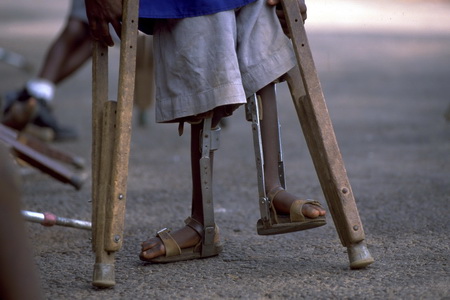Hit with a report of a third case of polio in northern Nigeria, leaders of the global eradication effort are asking themselves how they could have been so terribly wrong about the country. Like the other two cases detected last month, the new case—a 24-month-old boy—is living in the violence-wracked state of Borno, the stronghold of the terrorist group Boko Haram.
The devastating setback could not have come at a worse time. The beleaguered Global Polio Eradication Initiative (GPEI) is finally entering the home stretch, and program leaders were just about to declare a hard-earned victory in Nigeria—3 years without a case of wild poliovirus. Then, in mid-August, the country reported two polio cases in children in Jere and Gwoza districts.
Within days, DNA sequencing confirmed that the virus had been circulating in the region undetected for about 4 years. The new case was discovered in Monguno district, but the family came from Marte district, as did the family of the Jere case.
“We have to understand why we did not see the virus for 4 years,” says Michel Zaffran, director of GPEI at the World Health Organization in Geneva, Switzerland.
True, Borno poses unique challenges to the program, which has long been familiar with working in conflict zones by brokering “days of tranquility” during which vaccinations can occur, for instance, or else conducting “hit and run” operations when there is a lull in the fighting. The strategy has also relied heavily on vaccinating the streams of people who flee the violence. But under Boko Haram “the population is forbidden to leave,” Zaffran says. (The three cases detected so far are children whose families somehow managed to escape.)
“We thought surveillance was good enough,” Zaffran says—and overall in Borno state it was. What they missed were the “totally inaccessible” areas where the population had been trapped and was large enough to sustain transmission of the virus. “Are there other places we are blind? We can’t exclude that other populations have not moved. What innovative strategies can we use?” he asks.
A couple months ago Zaffran says he worried that the world was so close to finally eradicating polio that donors would declare victory prematurely and shift funds elsewhere. Now, he worries that the program might not learn the lessons from the “failure” in Nigeria.
In the wake of the Nigerian outbreak, program leaders are also taking a hard look at how GPEI can know when the virus is really gone. “We thought 3 years without a case was enough to certify a country polio-free. Nigeria tells us that 3 years may not be enough,” he says.
The outbreak has other implications as well: It costs money and saps morale. “But morale is very strong overall,” Zaffran says, “and we have faced this situation unfortunately in the past.”

